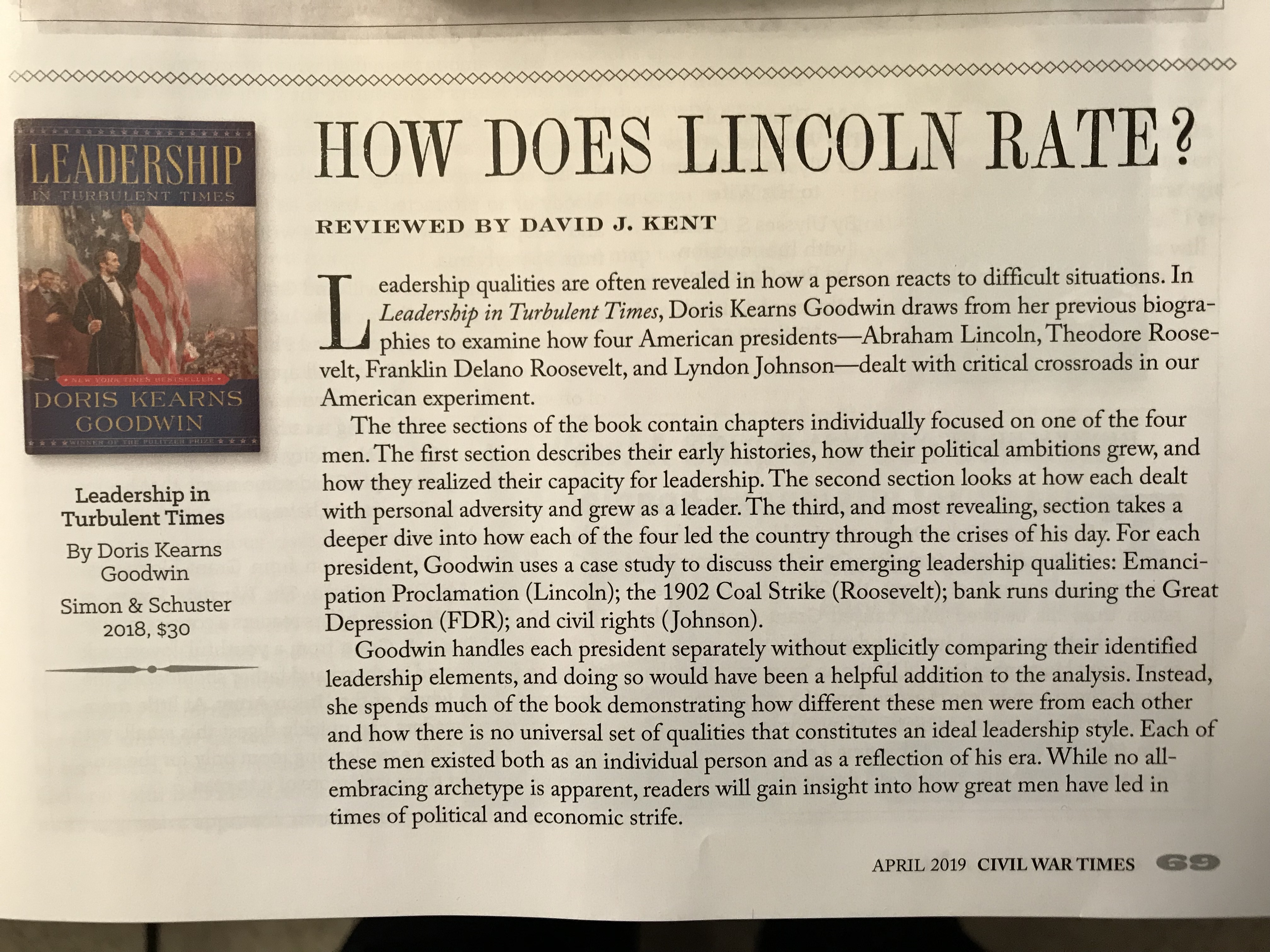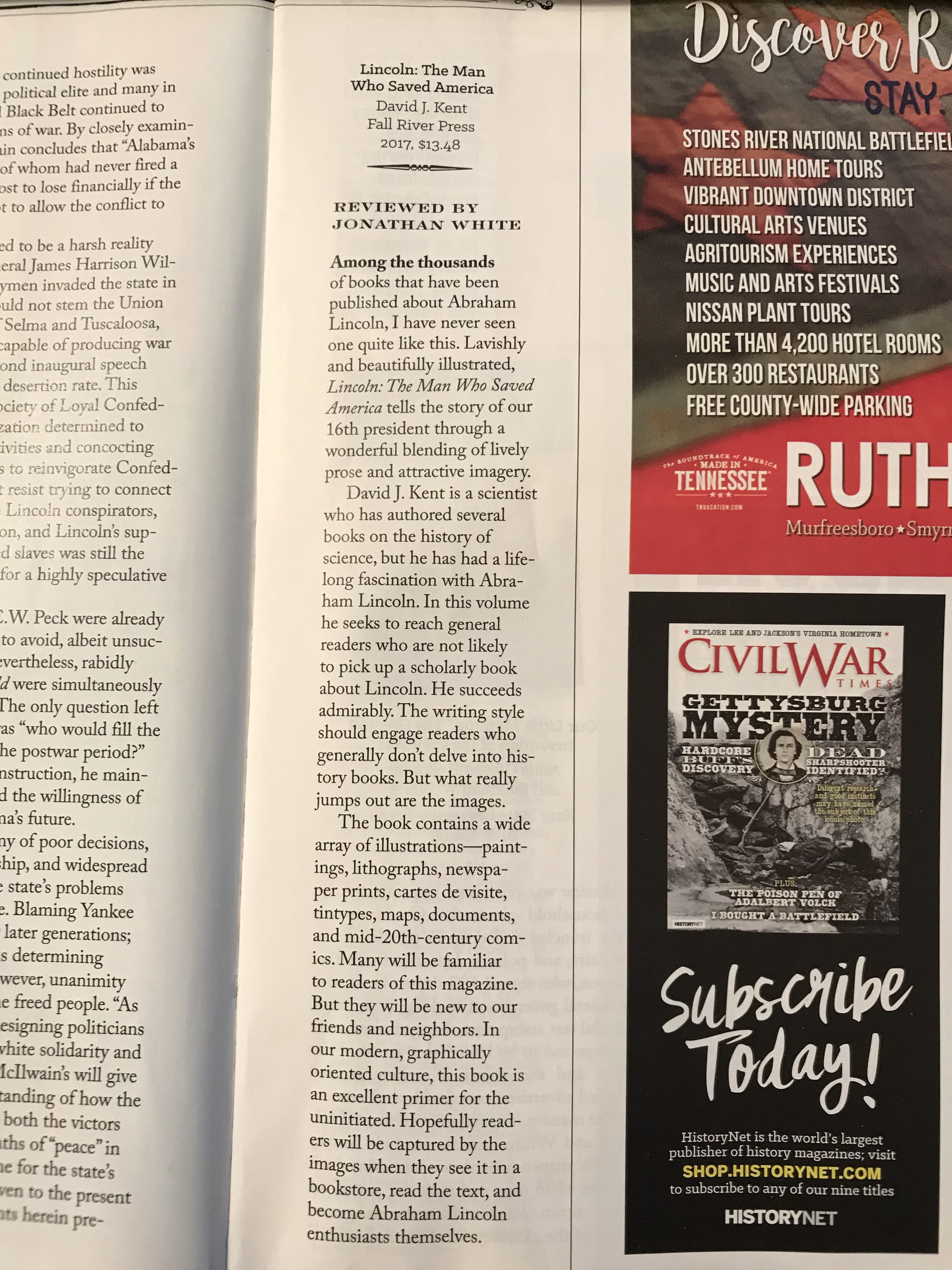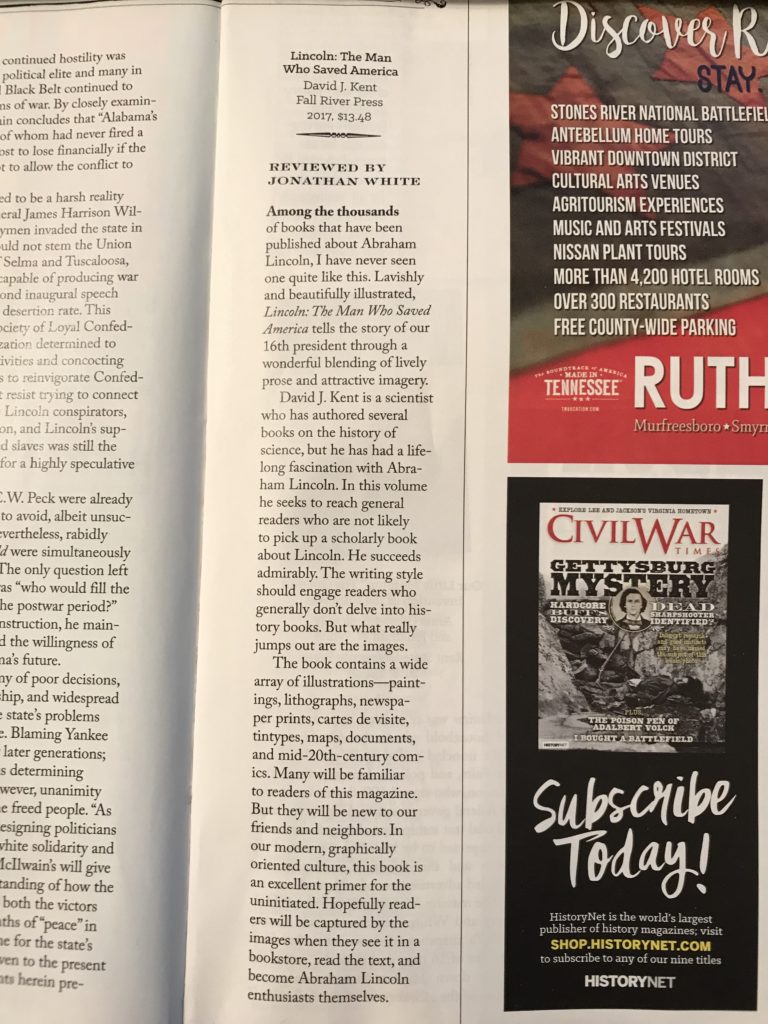Last year my book, Lincoln: The Man Who Saved America, was reviewed by Jonathan W. White in Civil War Times, the preeminent Civil War magazine. And now I’ve written a book review that is published in the most recent issue of Civil War Times.
The book I reviewed is called Leadership in Turbulent Times and is written by noted presidential scholar Doris Kearns Goodwin.
 Most people of heard of Doris Kearns Goodwin from her bestselling book, Team of Rivals, about Abraham Lincoln picking many of his political rivals to key cabinet positions. Initially well sold, it got a huge boost after then-candidate Barack Obama was seen carrying it on the campaign trail prior to his 2008 election, then again when Obama picked his rival Hillary Clinton to be Secretary of State, much like Lincoln put William Seward in that position. Another boost came from Steven Spielberg’s movie, Lincoln, which was based on a tiny part of Goodwin’s book.
Most people of heard of Doris Kearns Goodwin from her bestselling book, Team of Rivals, about Abraham Lincoln picking many of his political rivals to key cabinet positions. Initially well sold, it got a huge boost after then-candidate Barack Obama was seen carrying it on the campaign trail prior to his 2008 election, then again when Obama picked his rival Hillary Clinton to be Secretary of State, much like Lincoln put William Seward in that position. Another boost came from Steven Spielberg’s movie, Lincoln, which was based on a tiny part of Goodwin’s book.
Goodwin has written several other biographies of American presidents, including Teddy Roosevelt, Franklin Delano Roosevelt, and her one-time boss, Lyndon Johnson. She draws on all of these to extract leadership qualities exhibited by the four men, each of whom faced significant crises during their terms as president.
As I note in the review, she parses out each man’s characteristics separately and doesn’t explicitly compare their leadership traits. It becomes clear that each man was different in how they led, with these differences reflective both of their own personalities and the needs of the times they lived in. It’s an interesting book from which readers should gain a lot of thoughtful insight.
This is my first published book review in a national magazine, although not my first published book review. Since late 2015 I’ve published two dozen book reviews in The Lincolnian, the quarterly newsletter of the Lincoln Group of DC. There are many more reviews to come, including one for a book sent to me by the publisher that will appear in the next issue. I also hope to do more book reviews in Civil War Times and other national magazines. In addition, I’ll be pitching some article ideas that I hope will garner interest.
Up to this point my main writing focus has been on books, but my goals for 2019 include writing more magazine articles and entering more writing contests. This review of Goodwin’s book counts towards the former and I’ve already entered one contest (I’ll know if I made the cut by the end of the month).
If you haven’t seen Jonathan W. White’s review of Lincoln: The Man Who Saved America, here is a photo of the page in Civil War Times. You can read more about the review in this previous article.
 David J. Kent is an avid science traveler and the author of Lincoln: The Man Who Saved America, in Barnes and Noble stores now. His previous books include Tesla: The Wizard of Electricity and Edison: The Inventor of the Modern World and two e-books: Nikola Tesla: Renewable Energy Ahead of Its Time and Abraham Lincoln and Nikola Tesla: Connected by Fate.
David J. Kent is an avid science traveler and the author of Lincoln: The Man Who Saved America, in Barnes and Noble stores now. His previous books include Tesla: The Wizard of Electricity and Edison: The Inventor of the Modern World and two e-books: Nikola Tesla: Renewable Energy Ahead of Its Time and Abraham Lincoln and Nikola Tesla: Connected by Fate.
Check out my Goodreads author page. While you’re at it, “Like” my Facebook author page for more updates!



 My book, Lincoln: The Man Who Saved America, has been reviewed in Civil War Times magazine. Civil War Times is the “go-to” magazine for Civil War enthusiasts, and with a circulation of over 100,000, it’s the Number 1 magazine in its category. They also have a wide-ranging
My book, Lincoln: The Man Who Saved America, has been reviewed in Civil War Times magazine. Civil War Times is the “go-to” magazine for Civil War enthusiasts, and with a circulation of over 100,000, it’s the Number 1 magazine in its category. They also have a wide-ranging  Admittedly, the review is a little hard to find, as I discussed in
Admittedly, the review is a little hard to find, as I discussed in 
 The Immortal Life of Henrietta Lacks, by Rebecca Skloot
The Immortal Life of Henrietta Lacks, by Rebecca Skloot Renowned author Simon Winchester has written a wonderful book about a scientist most people have not heard about, but should have. Joseph Needham was a biochemist, nudist, socialist-leaning British scientist at prestigious Cambridge University. He was devoted both to his wife and his mistress, the latter of whom was a visiting Chinese scientist who introduced him to the culture he would obsessively love and study the rest of his life.
Renowned author Simon Winchester has written a wonderful book about a scientist most people have not heard about, but should have. Joseph Needham was a biochemist, nudist, socialist-leaning British scientist at prestigious Cambridge University. He was devoted both to his wife and his mistress, the latter of whom was a visiting Chinese scientist who introduced him to the culture he would obsessively love and study the rest of his life. Mark Adams is an editor and writer for adventure magazines who had never done anything at all adventurous. That is, until he became obsessed with Hiram Bingham III, the Yale lecturer and explorer who discovered Machu Picchu. Adams decides to follow in the steps of Bingham, and so begins a modern trek over ancient lands.
Mark Adams is an editor and writer for adventure magazines who had never done anything at all adventurous. That is, until he became obsessed with Hiram Bingham III, the Yale lecturer and explorer who discovered Machu Picchu. Adams decides to follow in the steps of Bingham, and so begins a modern trek over ancient lands. Climate change has already shown impacts not only on the world’s temperatures but on ocean acidification, sea level rise, and effects on plant and animal migration behaviors, among others. The Dake Page periodically reviews science-related books.It isn’t clear whether the impacts noted in Fire in the Turtle House are related to climate change or some other cause, but it reflects how quickly disruptions can result in catastrophic impacts on wildlife. What follows is a short review of
Climate change has already shown impacts not only on the world’s temperatures but on ocean acidification, sea level rise, and effects on plant and animal migration behaviors, among others. The Dake Page periodically reviews science-related books.It isn’t clear whether the impacts noted in Fire in the Turtle House are related to climate change or some other cause, but it reflects how quickly disruptions can result in catastrophic impacts on wildlife. What follows is a short review of  Historian Richard Wightman Fox employs a unique concept in discussing Abraham Lincoln: Lincoln’s body. His body – the physical, the figurative, the aura, and the memory – is used to trace how he was perceived at the time and during several periods since then to the present day. In doing so, Fox has successfully provided a mirror into not only Abraham Lincoln, but ourselves.
Historian Richard Wightman Fox employs a unique concept in discussing Abraham Lincoln: Lincoln’s body. His body – the physical, the figurative, the aura, and the memory – is used to trace how he was perceived at the time and during several periods since then to the present day. In doing so, Fox has successfully provided a mirror into not only Abraham Lincoln, but ourselves. As a writer it’s always interesting to read other people’s writing, especially when they are people I know. Of course, interesting could mean either good or bad depending on the quality of the writing, but it seems I’ve been lucky because the books I’ve read by friends and acquaintances have been wonderful. That includes works by
As a writer it’s always interesting to read other people’s writing, especially when they are people I know. Of course, interesting could mean either good or bad depending on the quality of the writing, but it seems I’ve been lucky because the books I’ve read by friends and acquaintances have been wonderful. That includes works by  An exceptional scholarly treatment. Author Fornieri examines the age-old question of what makes Abraham Lincoln great. His answer lies in the belief that Lincoln was a philosopher statesman, which he defines as being understood in terms of six dimensions of political leadership.
An exceptional scholarly treatment. Author Fornieri examines the age-old question of what makes Abraham Lincoln great. His answer lies in the belief that Lincoln was a philosopher statesman, which he defines as being understood in terms of six dimensions of political leadership.






